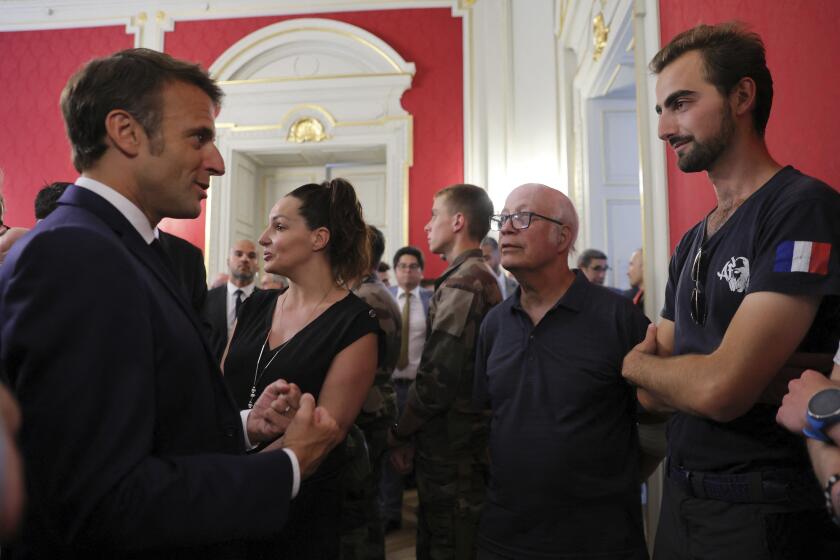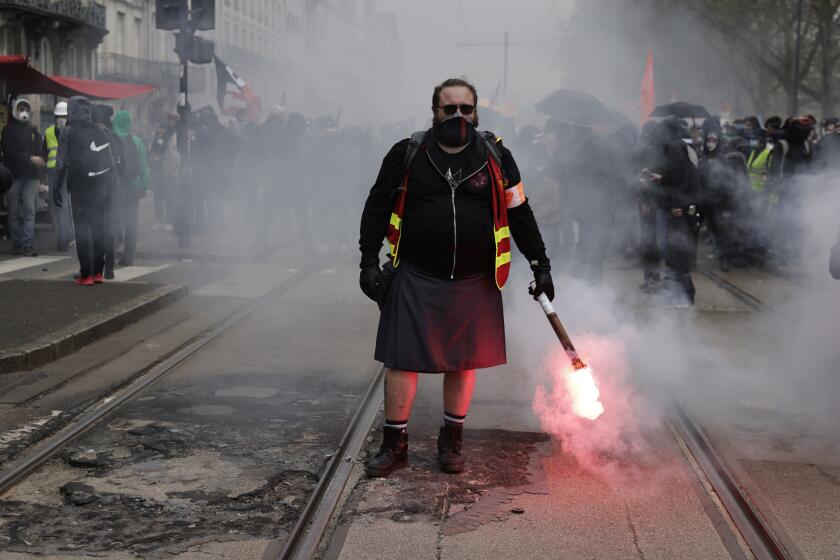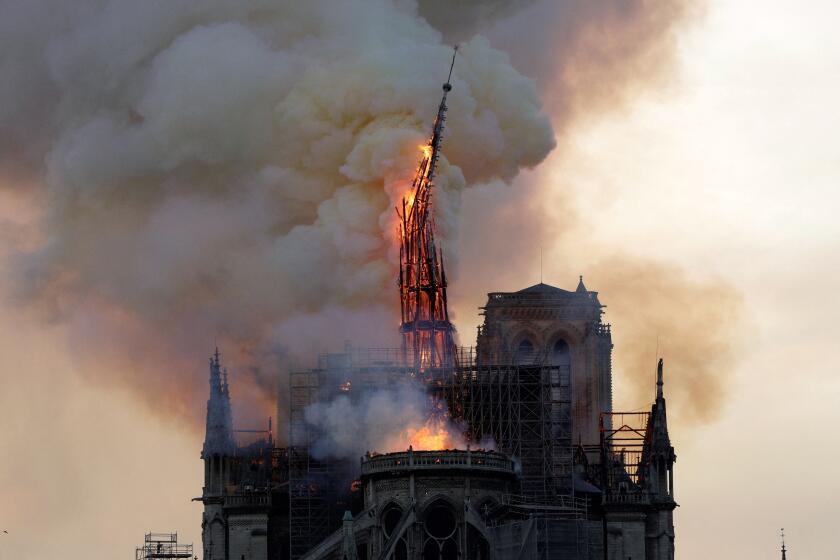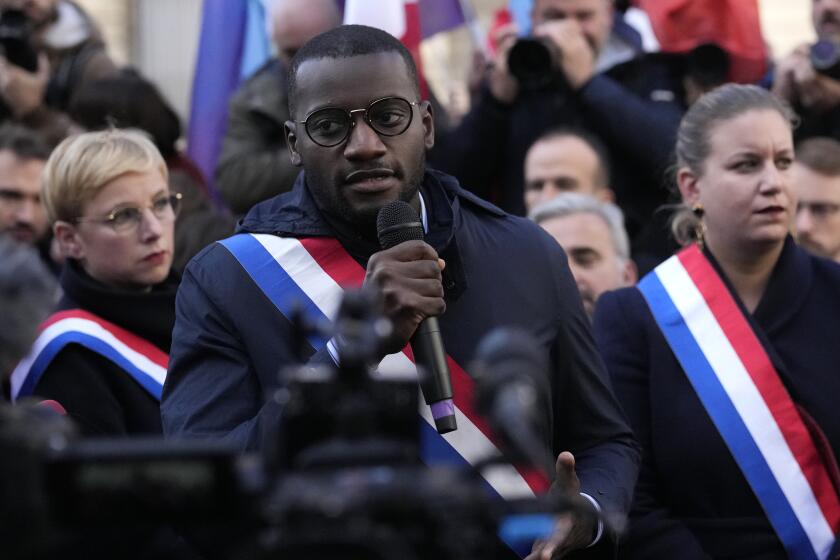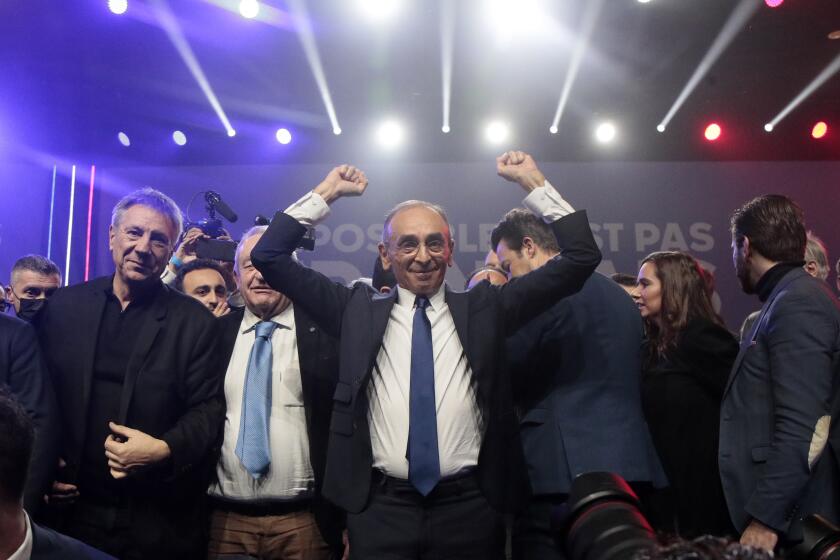917 arrested, 300 officers hurt in France in unrest over police shooting of teen
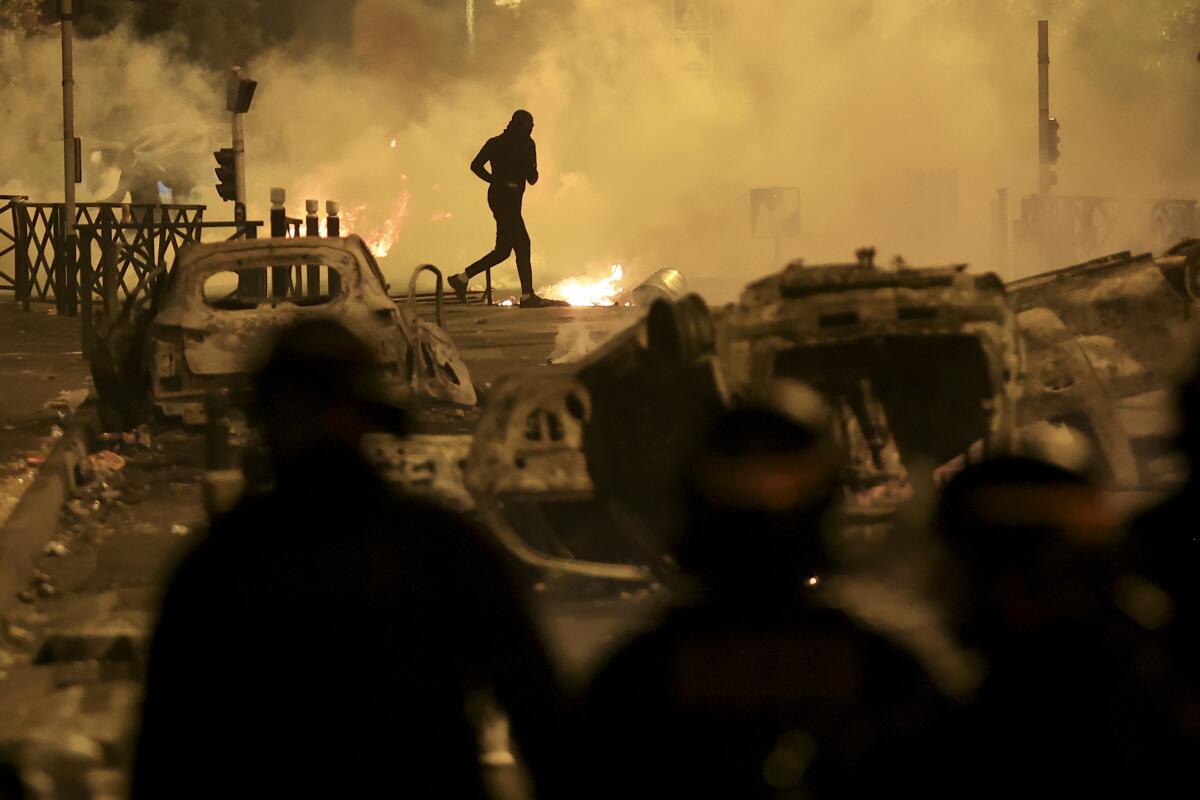
- Share via
PARIS — Rioters clashed with police and burglarized stores across France on Friday, in a fourth day of violence triggered by the fatal police shooting of a teen — piling more pressure on President Emmanuel Macron after he appealed to parents to keep children off the streets and blamed social media for fueling unrest.
Despite government appeals for calm and stiffer policing after successive nights of violence, Friday saw brazen unrest during daylight hours. An Apple store was looted in the eastern city of Strasbourg, where police fired tear gas; in a Paris-area shopping mall, the windows of a fast-food outlet were smashed, and officers repelled people trying to break into a shuttered store, authorities said.
The southern port city of Marseille, which was initially spared the violence that broke out first in the Paris region, experienced its second day of unrest. Young people hurled projectiles, set fires and stole from shops, according to police, who made at least 50 arrests. On Friday evening, rioters broke into a Marseille gun shop and made off with weapons; a man was later arrested with a hunting rifle, police said. The previous night, two off-duty officers suffered serious injuries — one was stabbed — when they were set upon by about 20 people, police said.
Authorities in Lyon reported more unrest in the suburbs, where rioters set fires and pelted police, and in the city center, where there was attempted stealing from shops, after an unauthorized protest against police violence drew about 1,300 people Friday evening. Police made 21 arrests.
French media are hailing ‘the hero with a backpack’ who grappled with an attacker during a stabbing rampage that critically wounded four children.
French territories overseas also saw violence.
In French Guiana, a 54-year-old was killed by a stray bullet Thursday night when rioters fired at police in the capital, Cayenne, authorities said.
On the Indian Ocean island of Reunion, protesters set garbage bins ablaze, threw projectiles at police and damaged cars and buildings, officials said in a statement.
In the face of an escalating crisis, Macron held off on declaring a state of emergency, an option that was used in similar circumstances in 2005. Instead, his government ratcheted up its law enforcement response. Police forces, already beefed up, were boosted by another 5,000 officers for Friday night, for a total of 45,000, Interior Minister Gerald Darmanin said. Some officers were called back from vacation.
Darmanin said police made 917 arrests Thursday alone and noted that the average age of those detained was 17. He said more than 300 police officers and firefighters had been injured.
Darmanin ordered buses and trams to stop running at 9 p.m., banned the sale and carrying of powerful fireworks and banned sales of canisters of gasoline, acids and other chemicals and flammable liquids.
He also delivered a warning to social networks to not allow themselves to be used as channels for calls to violence.
Protesters have disrupted vehicle traffic at Paris’ main airport and marched in the thousands against contentious pension reforms.
“They were very cooperative. We’ll see tonight if they really are. We are going to give them as much information as possible,” he explained; in return, French authorities hope to get the identities of people who incite violence.
“We will pursue every person who uses these social networks to commit violent acts,” he said. “And we will take all necessary measures if we become aware that social networks, whoever they are, don’t respect the law.”
Macron, too, zeroed in on social media platforms that have relayed images of cars and buildings being torched and other acts, saying they are playing a “considerable role” in the violence.
Singling out Snapchat and TikTok, he said the platforms were being used to organize unrest and were serving as conduits for copycat violence.
Macron said his government would work with technology companies to establish procedures for “the removal of the most sensitive content,” adding that he expects “a spirit of responsibility” from them.
Snapchat spokesperson Rachel Racusen said the company has increased its moderation since Tuesday to detect and act on content related to the rioting.
One of the most complex phases of the reconstruction of fire-ravaged Notre Dame de Paris is underway: the rebuilding of the cathedral’s famous spire.
“Violence has devastating consequences, and we have zero tolerance for content that promotes or incites hatred or violent behavior on any part of Snapchat,” Racusen said.
Macron said a third of the individuals arrested Thursday night were “young people, sometimes very young,” and “it’s the parents’ responsibility” to keep their children at home.
Tuesday’s fatal shooting of a 17-year-old, identified by his first name, Nahel, in the northwestern Paris suburb of Nanterre was captured on video, stirring up long-simmering tensions between police and young people in housing projects and disadvantaged neighborhoods.
Nanterre prosecutor Pascal Prache said officers tried to pull Nahel over because he looked young and was driving a Mercedes with Polish
license plates in a bus lane. He allegedly ran a red light to avoid being stopped, then got stuck in traffic.
A French far-right lawmaker has been suspended from the country’s parliament for 15 days, the maximum penalty, after a shouted remark during a legislative session.
The officer accused of pulling the trigger was handed a preliminary charge of voluntary homicide after Prache said his initial investigation led him to conclude that the use of the weapon wasn’t legally justified. Preliminary charges mean investigating magistrates strongly suspect wrongdoing but need to investigate further before sending a case to trial.
The officer said he feared he and his colleague, or someone else, could have been hit by the car as Nahel attempted to flee, according to the prosecutor.
His lawyer, speaking on French TV channel BFMTV, said the officer was sorry and “devastated.” The officer did what he thought was necessary in the moment, attorney Laurent-Franck Lienard told the news outlet.
“He doesn’t get up in the morning to kill people,” Lienard said of the officer, whose name has not been released, under French practice in criminal cases. “He really didn’t want to kill.”
Nahel’s mother, identified as Mounia M., told France 5 television that she was angry at the officer who killed her only child but not at the police in general.
“He saw a little Arab-looking kid; he wanted to take his life,” she said, adding that justice should be “very firm.”
“A police officer cannot take his gun and fire at our children, take our children’s lives,” she said.
Since the shooting Tuesday, rioters have erected barricades, lighted fires and shot fireworks at police, who responded with tear gas, water cannons and stun grenades.
The unrest comes just over a year before Paris and other French cities are due to host the summer Olympic Games. The Paris 2024 organizing committee said it was closely monitoring the situation.
France’s national police agency said many of the people detained in the unrest were from the Paris region. There were riots in towns and cities across France and in Brussels, where about a dozen people were detained and several fires were brought under control.
In Paris, people hurled firecrackers at security forces. The police station in the 12th district was attacked, and shops were burglarized along Rivoli Street near the Louvre and at the Forum des Halles shopping mall in central Paris.
Armored police vehicles rammed through the charred remains of cars that had been flipped and set ablaze in Nanterre.
Breaking News
Get breaking news, investigations, analysis and more signature journalism from the Los Angeles Times in your inbox.
You may occasionally receive promotional content from the Los Angeles Times.
Darmanin ordered buses and trams to stop running at 9 p.m., banned the sale and carrying of powerful fireworks and banned sales of canisters of gasoline, acids and other chemicals and flammable liquids.
Nahel’s mother, identified as Mounia M., told France 5 television that she was angry at the officer who killed her only child but not at the police in general.
“He saw a little Arab-looking kid; he wanted to take his life,” she said, adding that justice should be “very firm.”
“A police officer cannot take his gun and fire at our children, take our children’s lives,” she said.
Nahel’s grandmother, whose name was not disclosed, told Algeria’s Ennahar TV that her family has roots in Algeria. The Algerian Foreign Affairs Ministry said in a statement Thursday that the family’s grief was widely shared in the North African country.
Far-right French presidential candidate Eric Zemmour has no problem embracing a phrase that evokes a conspiracy theory embraced by white supremacists.
Nahel’s burial is scheduled for Saturday, according to Nanterre Mayor Patrick Jarry, who said France needs to “push for changes” in disadvantaged neighborhoods.
Deadly use of firearms is less common in France than in the United States; 13 people who didn’t comply with traffic stops were fatally shot by French police last year. This year, three people, including Nahel, have died under similar circumstances. The deaths have prompted demands for more accountability in France, which also saw racial justice protests after George Floyd’s murder by police in Minnesota in 2020.
Race was a taboo topic for decades in France, which is officially committed to a doctrine of colorblind universalism. In the wake of Nahel’s killing, French antiracism activists renewed complaints about police behavior in general.
This week’s protests echoed the three weeks of rioting in 2005 that followed the deaths of 15-year-old Bouna Traoré and 17-year-old Zyed Benna, who were electrocuted while hiding from police in a power substation in Clichy-sous-Bois.
Corbet and Leicester reported from Paris. Associated Press journalists Jeffrey Schaeffer and Aurelien Morissard in Nanterre; Raf Casert in Brussels; Claire Rush in Portland, Ore.; Frank Jordans in Berlin; and Angela Charlton in Paris contributed to this report.
More to Read
Sign up for Essential California
The most important California stories and recommendations in your inbox every morning.
You may occasionally receive promotional content from the Los Angeles Times.
